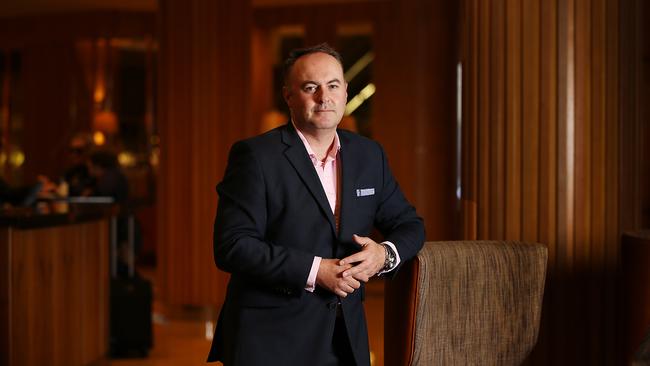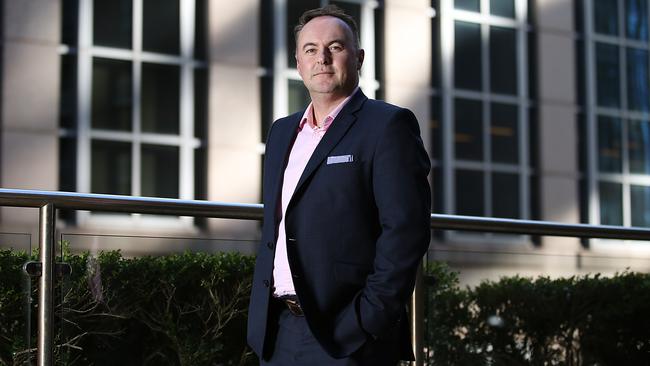How catching ‘falling knives’ led to a $1bn health tech success for Mark McConnell and Magentus
Becoming the CEO of what is now Magentus looked like a mistake three years ago for Mark McConnell, but now he’s not looking back.

Business
Don't miss out on the headlines from Business. Followed categories will be added to My News.
Serial entrepreneur Mark McConnell had already made enough money not to have to work, but just over three years ago headed back to a full-time executive role that he jokes takes up only “the first 80 hours of my week”.
The result of the move, both in and out of the office, has been transformational.
Canberra-based McConnell, 51, is the chief executive and co-founder of fast-growing health technology group Magentus (formerly Citadel Group).
He had never been Citadel’s CEO but helped found the company in 2007, was an active executive director and then major director and major shareholder. And then he became disillusioned with the strategic direction of the company as 12 years passed.
By then Citadel was listed on the ASX but McConnell thought it was losing focus and agitated for change, and was appointed CEO.
Then the company’s share price started falling. And falling.
Citadel’s market capitalisation dropped to as little as $70m as Covid struck in March 2020, only months after McConnell became CEO.
He kept buying shares as the share price was falling – like “catching falling knives” McConnell jokes – but after a big change in strategy and some transformational acquisitions, his return to full-time work is paying off.
Slightly more than three years later, after delisting from the ASX, Magentus is now owned by McConnell, private equity and superannuation fund investors and is worth more than $1bn.
McConnell says Magentus is just getting started and after winning several key, long-term contracts in the United Kingdom is now setting his sights on the US, where other Australian health tech companies like Pro Medicus have thrived – and got big valuation uplifts in the process.
“It is the holy grail. You’re not a global tech company unless you’re in the US and 60c of every global health tech dollar is spent there,” says McConnell.
“Australian health IP (intellectual property) is very well regarded globally. We have seen CSL, Cochlear, Ramsay and a bunch of Aussie health companies succeed overseas. We are very good at health IP and development, but to commercialise you need to go offshore. So we’re looking at a range of market entry options for the US now.”

Magentus has built a significant presence across the National Health System in the UK, where it claims the leading market position for radiology and maternal health software, with 80 per cent of NHS hospitals using its software that also includes pathology services.
It manages the largest single radiology information system in the world in the Republic of Ireland and its Genie Solutions subsidiary in the UK provides clinic management software and systems for more than 22,000 medical professionals across at least 5000 practices, to give it a 72 per cent market share.
In Australia it has 45 per cent market share for laboratory information management systems, including the largest such contract in the Southern Hemisphere in Queensland.
A prodigious networker, McConnell says he took 165 flights in 2022 and is on track to take more this year, and he has already overseen 16 acquisitions in almost 20 years in business.
“My strengths are outbound matters, dealing making, financial engineering and marketing, seeing trends and adapting to those to go into new markets.”
He says the reason the health sector is worth investing in is because it is one “of the last remaining industries to move into the digital age – literally moving from pad, pen and fax into streamlined digital workflows that increase efficiency and efficacy, reducing downside risks and allowing data to be interrogated in ways never seen before.”
The data that health technology companies can gather, McConnell says, “provides real time insights to specialists and clinicians. The insights gained from data are in high demand from groups such as Big Pharma, and regulated health bodies around the world. Unlocking the value of our health data through commercialised insights will allow Magentus to scale globally with unprecedented speed.”
McConnell says being in the health system is a good part of the reason why he become CEO in 2019 – “there is a high level of altruism for people who work in health … and it does help you attract good people” – but he was also growing increasingly concerned about what was his biggest investment.
A former Young Rich List member, McConnell served as an officer in the Royal Australian Air Force for eight years before moving into the corporate world and forming Citadel in 2007 with Miles Jakeman.
The business concentrated on education and technology services to government agencies and floated on the ASX at a $100m value in 2014.
McConnell had started as an executive director, later remained a major shareholder and on the board, and set about investing in other health and technology businesses through his Mera Vale family office.
It helped seed fund gym group Viva Leisure ahead of its 2018 float, later exiting after making a return of five times McConnell’s initial investment, and has put money into venture capital fund HOF Capital, which has investments in health, medical and life science start-ups, and air purification business vBreathe.
But McConnell remained an active non-executive director and shareholder of Citadel, and by 2019 thought the company was pushing in the wrong direction.
He presented an alternative strategy to reset Citadel’s model and move towards a global health and software as a service business, and was appointed CEO late that year with what he says was a different mindset to what he’d had earlier in his career.
“When you don’t need to work you value every minute. When you’re at work then you’re looking for evidence that it is worth investing your time in, because every minute there is a minute I could be spending with my family,” McConnell says.
“So I think [becoming] a CEO I was able to find a purpose that was going to wake you up every day, and being in health that is improving patient outcomes and making a difference. So I have consciously decided that devoting 80-100 hours a week here can lead to some great outcomes.”
What was to become Citadel 2.0 included a $200m deal to buy UK firm WellBeing Software and then an ASX delisting led by Pacific Equity Partners as part of a $500m transaction in late 2020.
Super fund HESTA invested $120m into what is now Magentus a year later when McConnell’s company bought medical practice software business Genie Solutions, to give Magentus a likely valuation of more than $1bn.
The company’s value has likely increased since then and McConnell could be a future member of The List – Richest 250 based on his large stake, particularly if there are further deals or Magentus eventually goes public again.
“Companies that are owned by private equity tend to re-emerge as an IPO, either here or on the NASDAQ, or there’s a large trade sale or replacement PE. I’m still young, I’ve got a lot of energy and a lot to give. While I’m still adding value I’ll still be here.”
More Coverage
Originally published as How catching ‘falling knives’ led to a $1bn health tech success for Mark McConnell and Magentus





